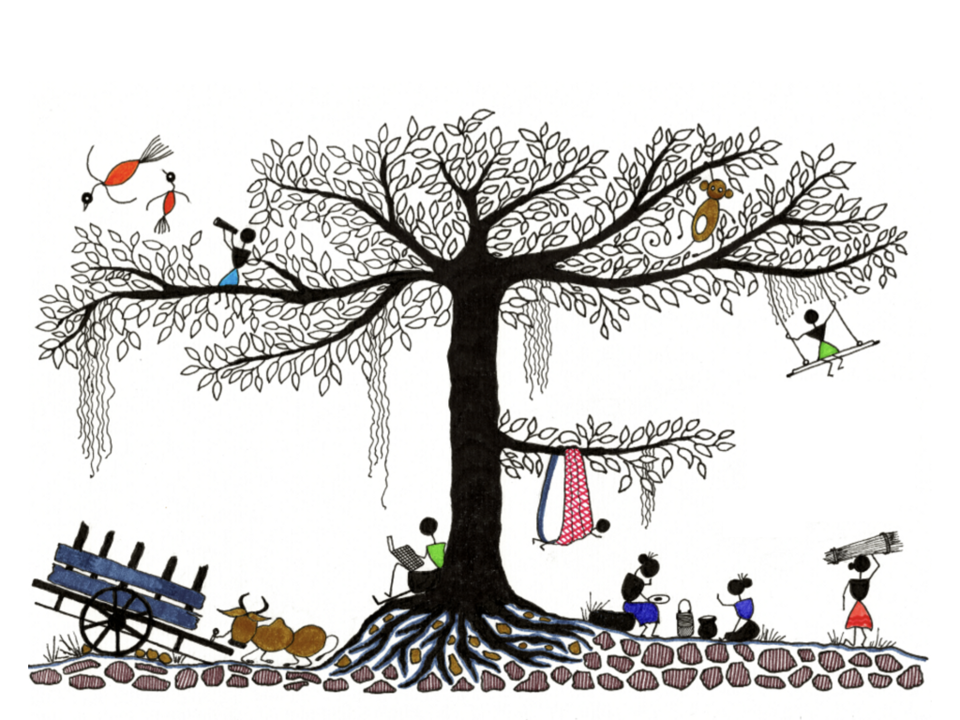
Say, Sister
Aila, Bulbul.
Cyclones in the Sunderbans can have endearing names like the women who live here. For a million women living in the estuaries between India and Bangladesh, the highway stops at the river. The men have long migrated, leaving them with responsibilities but hardly any means.
Welfare needs three boat-rides to reach them.
Police pickets prevent small jars of wild honey to plug into the global supply chain. Stranded in the mangrove islands, the women wait for a new bridge across the river. There is a missing link between welfare and well-being.
We believe it is Competency.
In ultra-remote communities like the Sunderbans, women have natural tendencies to draw, paint and illustrate to enhance the products they use, and the homes they live in. Every woman here know how to create Alpana, creative motifs made of rice-paste.
The global illustration marketplace is a meritocracy. It doesn't depend on age or qualification but only on competency.
Using a $1 Classroom that re:imagines Paper + Radio, we have embarked on a project to train 3,000 women in SE-Asia as illustrators, starting in the Sunderbans delta, organize them into cooperatives and connect them directly to the global illustration marketplace for children's books.
Why we believe in this project?
The solution for climate change, livelihood and inclusion for the Sunderbans is embedded in its history. In 2009, the World Wildlife Fund made a desperate search for a long-forgotten salt-tolerant paddy known as the Hamilton, to fight against the effects of Cyclone Aila on agricultural land.
Sir Daniel Hamilton, the Scottish visionary after whom the seed was named, not only triggered this land of 2.5 million but also set in place a network of cooperatives, that are in ruin and disarray today.
Our approach to develop competency, anchored by cooperatives is inspired by Sunderbans's past and the Capability Approach.
How this will advance inclusion for women?
The Say Sister project will create income augmentation for 3000 women organized in 100 cooperatives across SE-Asia. Participation will be inclusive of age, education level and disability. They will be trained to make illustrations, develop useful literacy and computing skills identified by region specific PA programs, manage themselves, and get connected directly to agencies and writers.
Each Say Sister as a community leader will train in turn a cohort of 100 women in her community for financial literacy, and act as a distribution point for government welfare and inclusion schemes.
The impact of the program will span 300,000 women.
Impacting marginalized communities.
Creating income in the knowledge economy is an unattainable idea for marginalized communities. The Say Sister project creates a bridge over extant supply chain gaps that will never allow a marginalized woman to illustrate for a writer in the organized economy.
Connecting ultra-impoverished communities to a global meritocratic marketplace can become a beacon of best practice for what is possible if training, technology and market-access come together.
UNHCR has noted transformational outcomes in Participatory Assessments. Participation is the key success factor for community-led entrepreneurial activity and can drive inclusion outcomes more efficiently by leveraging tacit knowledge within the community.
Why us?
The critical success factor for a project of this nature and scale is the cost of the learning delivery. We have developed a $1 Classroom that re:imagines Paper and Raspberry Pi to deliver a curriculum at a cost of 1 USD per learner per year.
This ability gives Say Sister a sustainable global potential.
We have tested and developed our methodology in the field over 6 years, working with hundreds of anchor trainers and learners in marginalized communities, delivering complex projects across India with partners like the Aga Khan Development Network.
How we may fail?
We do not possess any extraordinary credibility in the gender-equity space.
However, our work has involved thousands of sensitive engagements with women learners and community workers for whom empowerment and inclusion outcomes are difficult to unravel in a complex tapestry of issues.
We have realized that the best step for success is to be foolish, resilient and stubborn and develop the ability to stare at a board of dots and identify a sweet spot that can be transformed into a moon-shot!
Founded in 2014, we are a women-driven Not for Profit and geared to work hard.
Why is this project unique?
Around the world, the impact of climate change and exclusion on marginalized communities are triggered by an unwillingness to understand their past, and the lack of an interdisciplinary approach for their future.
In the case of the Sunderbans, we have illustrated how we are leveraging an in-depth understanding of their history, culture, society and geography to empower tacit knowledge in the community. We aim to accentuate this approach using modern technology like Raspberry Pi and something as accessible as Paper. This interdisciplinary orientation ensures community acceptance and our ultra low-cost methodology sets us up for success and sustainability.
Support the Say, Sister project at wallobooks.org